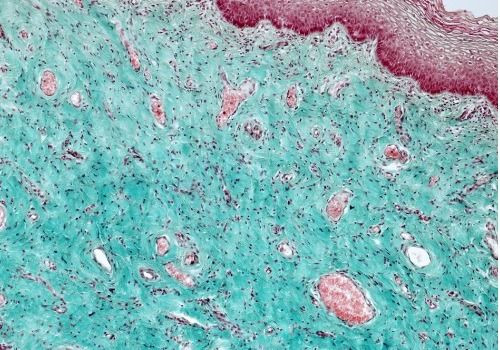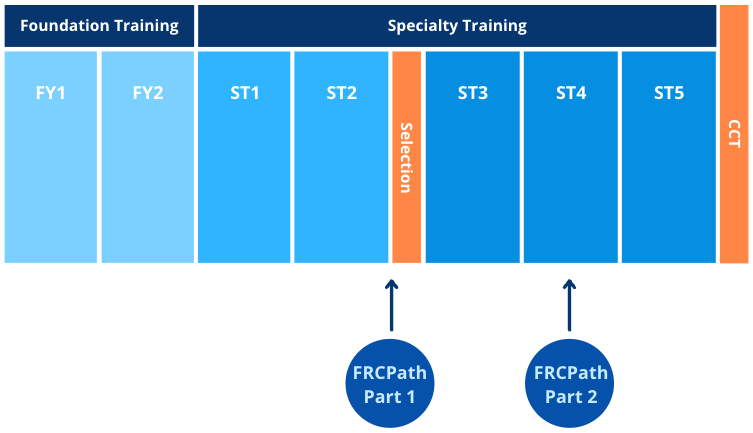UK Training Pathway for Histopathologists
- February 21, 2022

The NHS offers an extensive training scheme and career development for histopathologists, and the quality and depth of this programme is recognised as a gold standard across the medical community.
The training provided to UK histopathology trainees is regularly reviewed and updated, in keeping with advances and progression in the landscape of pathology around the world and across the profession. This makes the training programme attractive to UK graduates, as well as overseas histopathologists seeking the best training programmes for their field.
In this article, we will explore the training pathway for histopathologists in the UK, covering the following topics:
- What is the NHS Training Pathway?
- How do you enter the training pathway?
- What does the specialty training programme look like for histopathology?
- What happens after completing the histopathology training programme?
- Can I enter specialty training in the UK as an IMG?
The NHS Training Pathway
The NHS training pathway is the name given to the complete programme undertaken by UK trainees, from medical school to the completion of specialist training within I.e. within histopathology.
It is important for IMGs to understand this as it helps to provide an understanding of at what stage they can most likely enter the system if they are interested in training in the UK.
Entering the NHS Training Pathway
After graduating from medical school, doctors with receive provisional registration from the GMC which allows them to enter the Foundation programme (a two-year work-based training programme).
Upon completion of the first year (FY1), doctors will gain full registration with the GMC and will be able to apply for further study and training in a specialised area I.e. histopathology – this is known as Specialty Training (ST).
Specialty Training in Histopathology
The Specialty Training programme in Histopathology is 5 years long, and whilst doctors may pass through training quicker depending on how quickly they achieve their competencies, this is rarely the case and histopathologist will usually take the indicated time, or slightly longer to complete the Specialty Training programme.
Successful applicants entering into year one of specialty training (ST1), will follow the Royal College of Pathologist’s 2021 Histopathology Curriculum, which sets the expected syllabus as well as required assessments and workload case numbers.
Histopathology training as a run-through programme
Unlike some specialisms where you complete a period of core training before entering into specialty training (requiring two applications), histopathology specialty training works as a run-through programme. You only have to apply once, at the beginning of the programme, as you are recruited for the full duration of Specialty Training.

Foundation Training (FY1 – FY2)
The foundation programme usually involves six different rotations or placements in medical or surgical specialties. These rotations enable trainees to practise and gain competence in basic clinical skills.
Specialty Training (ST1 – ST5+)
ST1)
Year one trainees enter the training programme. In this first stage, trainees will initially develop knowledge of laboratory work, with basic training in all areas of cellular pathology.
Training starts with a 1-2 week induction from the training school. This includes some time in the lab seeing how specimens are prepared and processed. Trainees are taught how to use a microscope, how to approach simple cases under the microscope and the principles of macroscopic assessment and sampling (AKA ‘cut up’). Many training schools do a separate autopsy induction.
When not at block teaching weeks, trainees are rotating through the various specialities in histopathology.
ST2 – ST3
This part of training takes place from year 2 to year 3, with the focus on achieving the FRCPath Part 1 Exam. This will normally be taken after 18 – 24 months of training.
Trainees will consolidate and develop their knowledge base from ST1. Year two trainees are given more independence and are expected to be able to cut up most specimens by the end of this stage.
In many deaneries, this is the time when trainees complete rotations in sub specialities including paediatric pathology, neuropathology and oral pathology. Trainees may rotate to placements in local district general hospitals to gain valuable experience in managing a general histopathology workload.
Autopsy and cervical cytology training continue as mandatory elements of ST2-ST3. Some trainees choose not to continue these specialities when they have completed this stage.
The FRCPath Part 1 exam aims to determine whether you have successfully acquired a core body of knowledge that will underpin your ability to practise in Histopathology.
For more information of the first exam in the Royal College of Pathologists examination suite, take a look at our IMG Resources library here.
Please note, trainees must pass the FRCPath Part 1 examination at the end of ST3 in order to progress to ST4.
Selection
Here, trainees will either choose to continue with general histopathology or peruse subspecialisation in neuropathology, paediatric/perinatal pathology, cytopathology or forensic pathology.
ST3 – ST4
This training takes place from years 3 – 4, where trainees will either continue with general histopathology or peruse subspecialisation in neuropathology, paediatric/perinatal pathology, cytopathology or forensic pathology. Trainees are expected to be competent in the macroscopic and microscopic assessment of all specimens, and will also receive training in leadership, management and teaching in preparation for their future roles as consultants.
The focus during this stage is also on achieving the FRCPath Part 2 Exam, thereby obtaining the status of Fellow of the Royal College of Pathologists.
This final exam is designed to test your practical skills and understanding, and show that you can apply your expertise appropriately and safely.
Trainees who wish to continue in general histopathology may opt to sit further exams in cervical cytopathology and autopsy practice if they wish to continue these as a consultant.
To learn more about the final exam in the in FRCPath examination suite, read our detailed blog here.
Please note, trainees must pass the FRCPath Part 2 examination at the end of ST4 in order to progress to ST5.
This is the final stage of training before CCT during which histopathology trainees may wish to peruse special interests in particular subspecialties, such as gastrointestinal, skin or gynaecological pathology. Having passed the FRCPath Part 2 exam, trainees will continue to take on responsibility to enable the transition to independent practice required of those with CCT, i.e. signing out reports without consultant review.
Completion of the Histopathology Specialty Training Programme
Upon completion of the training programme, the choice is made as to whether the trainee will be awarded a Certificate of Completion of Training (CCT) in Histopathology. This will be based on criteria set out in the curriculum by the Royal College. You can find the 2021 curriculum here.
At this point, the histopathologists are entered onto the specialist register and can now take permanent consultant posts in the NHS.
Specialist Registration for overseas doctors
Doctors who completed part or all of their histopathology training outside of the UK are eligible for specialist registration through the CESR or CESR-CP pathways. To learn more about specialist registration for overseas doctors, read our blog here.
Joining the Histopathology Specialty Training Programme as an IMG
It is possible for overseas doctors to join the Specialty Training programme in Histopathology in the UK, however it is very competitive.
IMGs interested in UK specialty training must have:
- Full GMC registration
- Completion of a minimum 12-month (FY1 equivalent) internship
- English language test
- PLAB
AND
- 12 months post-internship experience by the time you begin ST1
Although UK trainees are not given priority for specialty training places, it can be very difficult to join the Specialty Training programme without NHS experience.
So here you have it, the NHS Specialty Training pathway for trainees in a nutshell. This training scheme is the core of training for histopathologists in the UK, and for IMGs looking to join the training programme, understanding of the pathway allows you to better align your overseas training with the relevant stage you would enter into Specialty Training in the UK.
If you have any further questions about your route to the UK as an overseas histopathologist, FRCPath, or any other aspect of GMC Registration, the NHS or the UK, please get in touch with us here.
We'd also like to invite you to join the IMG Histopathologists online community - as well as support on Royal College exams, our Facebook group of international pathologists and dedicated pathology recruiters offers guidance on other aspects of working in the UK, including finding NHS posts and CESR.
Follow us on social media through the links below for regular news and updates on the Royal Colleges, relocating to the UK and working in the NHS:



